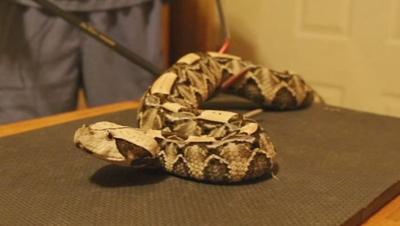SLADE, Ky. (WDRB) -- A Kentucky couple has dedicated their lives to helping others through an unconventional way with the help of some of the most dangerous animals in the world.
Jim Harrison and Kristen Wiley own and operate the Kentucky Reptile Zoo, which is home to nearly 2,000 venomous snakes including cobras, mambas, rattlesnakes and vipers.
“I just wanted to have a place where I could have a larger amount of animals and I could also educate people,” Harrison said.
Along with educating, he wanted to save lives.
Inside several sheds are where the snakes are housed, monitored closely and checked several times daily. Inside the sheds, Harrison and Wiley extract the snake’s venom, a process known as milking.
The snakes, such as gaboon vipers, are encouraged to bite along the edge of a glass beaker. It’s painless to the animal, and the venom from its syringe-like fangs then drips into a vile.
It’s a small dose of liquid gold that is becoming crucial in medical field testing.
“A lot of cancer research is coming from snake venom. Anti-venom comes from venom," Harrison said. "It does save a lot of lives. Actually, more people are saved from venom than die from venom."
The zoo supplies venom to hospitals not only here in the United States but also to research centers around the world. Depending on the snake, four types of venom and toxins are produced, each used in a different way.
“We are doing a project now with South American rattlesnake venom that is in human testing in Europe for cancer,” said Harrison, who is also testing alternatives to certain opioids. “There are pain receptor toxins in the [mamba] venom -- the neurotoxins that will block the neurons so you don't feel pain. We have also seen quite a few venom-derived products, most notably ACE inhibitors used for hypertension come from a South America pit viper.”
The University of Kentucky is one of several hospitals around the country that are using the venom supplied by the zoo.
“It's great having them here," said Dr. Pete Akpunonu, director of medical toxicology at UK. "They are a very knowledgeable resource, because they’re people who know more about exotic envenomation here in the United States than most."
Occasionally, he sees patients who are bitten by one of Kentucky’s four native venomous snakes, and the anti-venom helps reverse the symptoms.
Forty-one years of snake experience did not come without its close calls for Harrison, who is a former police officer. He has been bitten 11 times, been on life-support seven times and clinically died three times.
“Every morning I wake up, I'm already prepared to die," Harrison said. "I've already died, so I am not sacred to die."
It’s that tenacity and survival attitude, much like his snakes that keeps, Harrison risking his life every day. Some days, he and his wife will milk 800 snakes or more. It’s supply and demand: Some of the most in-demand venom can come at a pretty heavy price. Gaboon viper venom goes for about $130 per gram.
It’s an extremely dangerous job that doesn’t come with a paycheck. Harrison relies on his police pension, so he doesn’t take a salary working with the snakes.
Despite that, he still spends much of his time with hooks in hand and a laser focus, risking his life so other’s might be saved.
“It is important for me to give something back," Harrison said. "I don't like seeing suffering. When most people think of venom, they think of death. I think of life.”
The Kentucky reptile Zoo is located at 200 L&E Railroad Place in Slade, Kentucky. They can be reached at (606)-663-9160
Copyright 2018 WDRB Media. All Rights Reserved.











